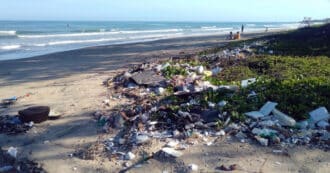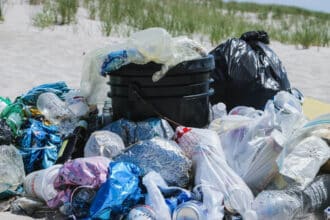By Harry Cooper – Plastics have become one of the biggest environmental issues facing our world today. The public’s concern over plastic pollution has consequently continued to grow.
The growing awareness has spurred consumers and corporations alike to look for solutions. One way people have tried to fix plastic pollution is by using plant based plastics.
Plant based plastic is a type of bioplastic, meaning it’s made from renewable, organic materials. These materials are meant to create a more biodegradable plastic.
By being more biodegradable, plant based plastic should be able to decompose and become a part of the environment instead of ending up as litter. While plant based plastics use less fossil fuels than petroleum based plastics, and requires less oil refinement, it may not be a fix all to plastic pollution.
Plant based plastics are not perfect. Bioplastic production still uses a certain amount of petroleum that makes it harmful to the environment to an extent, and makes it less biodegradable than one is led to believe.
The Plastic Problem
Plastic is a versatile light weight material that can be used for lots of different purposes. However our usage of plastic has become so excessive that it is starting to cause some serious environmental problems.
It is estimated that there is 8 million and growing metric tons of plastic in the ocean. This massive amount of plastic is known to cause animals to choke or become entangled in it, but the real threat of plastics to the ocean is when the plastic starts to break down.
Plastics such as plastic bottles and bags do not decompose like some kinds of waste. This means that if it ends up in the environment it can stay there almost indefinitely.
While plastic is capable of breaking down, it only breakdowns into microscopic pieces called microplastics. These microplastics are incredibly toxic and when they exist in high enough concentrations they are ingested by marine animals which can greatly disrupt ecosystems.
Microplastics can also be found in humans from when we eat fish that have been caught in areas with lots of microplastics. Thus, as plastic pollution gets worse and worse, human health and the environment will become increasingly more at risk.
What Are Plant Based Plastics?
Plant based plastic is a type of bio based plastic made from plants of microorganisms. By making plastic in this way, manufacturers hope to offer an alternative to traditional plastic that is more environmentally friendly.
Plastic production relies heavily on fossil fuels and petroleum to make plastic products. This way of making petroleum based plastics has an incredibly high carbon footprint and is incapable of biodegrading.
On the contrary, plant based plastic is made from organic materials. This is done by extracting sugar from sugar cane or corn starch in order to make polylactic acids that can be made into plastics.
Bioplastics can also be made from polyhydroxyalkanoates which are synthesized from microorganisms. By using these organic materials, we can start making more biodegradable plastics with smaller carbon footprints.
Advantages of Plant Based Plastic
There are many advantages of using plant based plastic over fossil based plastic. Not only is it more biodegradable, but it also has a significantly smaller carbon footprint. Traditional petroleum based plastic uses large amounts of fossil fuels. In fact it is estimated that plastic production uses around eight percent of the world’s oil supplies.
Proponents of plant based plastic tout that if we were to stop using so much oil for plastic production we would have much greater oil supplies. Thus by using plant based plastics we could greatly reduce the amount of oil and fossil fuels we use, and in turn our carbon footprint.
Disadvantages of Plant Based Plastic
Plant based plastic may seem like a good way to keep making plastic without having to worry about it harming the environment. However, when we look past the surface, plant based plastics are not the fix all to our plastic problem that they seem to be.
Plant Based Plastic Still Uses Petroleum
Coca-Cola recently announced its new PlantBottle which is a coke bottle made out of plant based plastic. While this was meant to be seen as a big step by the company to reduce plastic waste, it was not necessarily helpful.
Only around 30% of the plastic in the PlantBottle comes from plant sources, the other 70% comes from traditional petroleum. So while the bottle may be in part plant based, it is not completely made from environmentally friendly materials.
While the PlantBottle is only one case of ineffective plant based plastic, it does speak to how not all bioplastics are sustainable. While plant based plastic may use less petroleum, it does not mean that it is made completely without it.
Not Completely Biodegradable
Plant based plastics are also not as biodegradable as they initially seem. While some bio plastics may be a little more biodegradable, the reality is a little more complicated.
As it turns out biodegradable plastics are not able to decompose anywhere you would throw them on the ground. In fact, most plant based plastic requires the help of industrial facilities to decompose.
Plant based plastic requires being super heated in order to fully decompose. This is done at industrial composting facilities, which are not equally accessible throughout the world.
Thus, when plant based plastic gets thrown out, it often ends up breaking down in the same way petroleum based plastic does, instead of biodegrading. This creates more microplastics, and continues to make our plastic problem worse.
It is still not known how harmful plastic is to our health, and even less research has been done into plant based plastic specifically. However, initial research has found that bioplastics contain some toxic chemicals that come from additives to the plastic.
Alternative Solutions
While plant based plastics are capable of reducing our carbon emissions by using less petroleum and in some cases being partially biodegradable, they are often cited as a prime example of greenwashing. Greenwashing is a business tactic where companies present a product or business practice that seems environmentally friendly on paper in order to make their company look good, but doesn’t actually do anything to solve the world’s environmental problems.
Many companies have started making their products out of plant based plastic. However, this does not do much for the environment or anyone, other than make the companies look better.
Rather than trying to make plastic more compostable, many experts suggest solving our plastic problem by simply using less plastic in general. This task may seem pretty daunting as we already throw around 11 million tons of plastic waste into the ocean every year, and plastic production is set to triple by 2040. Curbing our plastic usage will not be easy.
While it may not be as easy as making more environmentally friendly plastic, it is certainly more effective. We can start by using less plastic packaging, as this is seen as one of the main drivers of plastic pollution. We can also start replacing some of our plastic items with more biodegradable ones such as paper, compostable materials, and even some of the more effective bioplastics.
While our plastic based economy would take a lot of time and money to completely overhaul, it would not be to no avail. A study done by Pew Research found that if we were to follow expert plans and recommendations on how to shift our society away from plastic, we could expect to see an 80% reduction in plastic waste throughout the next twenty years.
Religion and Plastic
Numbers 19:14–15 – This is the ritual: When a person dies in a tent, whoever enters the tent and whoever is in the tent shall be unclean seven days; and every open vessel, with no lid fastened down, shall be unclean.
Reusing Containers From Eco Bible
The Talmud teaches that immediately before he died, Rabbi Yochanan ben Zakkai (1st century CE) told his students to remove earthenware vessels from the room he was in, so the vessels would not become impure and need to be destroyed. Caring for physical possessions that he would no longer use – but someone else could – was one of the last acts before Rabbi Yochanan ben Zakkai’s transition from the physical world.
Prior to the COVID-19 pandemic, cities and restaurants were making strides in reducing the use of single-use plastic bags and containers. Yet, plastic pollution overall was still expected to grow by 40 percent between 2020 and 2030. The component of worldwide plastic pollution increasing most rapidly is nonreusable food packaging, which comprises more than 40 percent.
During the pandemic, people increased their use of disposable packaging for takeaway food. As a 2021 study indicated, “The amount of plastic wastes generated worldwide since the outbreak is estimated at 1.6 million tons/day. Approximately 3.4 billion single-use facemasks/face shields are discarded daily as a result of COVID-19 pandemic, globally. . . . COVID-19 will reverse the momentum of years-long global battle to reduce plastic waste pollution.”
More and more, we take for granted our use and “easy” disposal of plastic wrap, plastic sandwich bags, and food and snack items in individual plastic wrappers. Yet, the example of Rabbi Yochanan ben Zakkai can show us how to make concern for the containers and wrapping materials we use part and parcel of spirituality.







